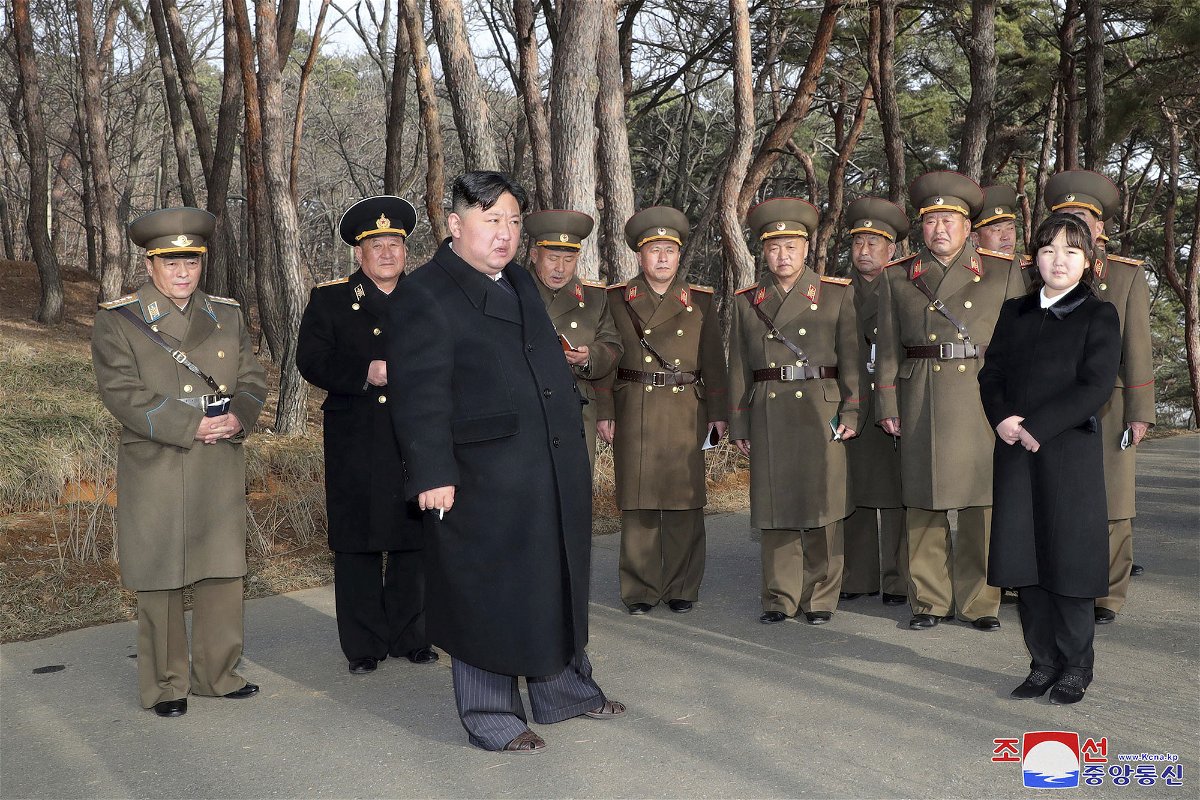North Korea fires at least six short-range missiles as Kim Jong Un and daughter look on

In this photo provided by the North Korean government
By Yoonjung Seo and Brad Lendon, CNN
North Korea fired off at least six short-range missiles on Thursday afternoon in what could be the opening salvo in weeks of military displays on both sides of the demilitarized zone separating the two Koreas, analysts said.
Photos released by state-run media on Friday showed North Korean leader Kim Jong Un attending the Hwasong artillery unit’s fire drill on the western front, along with his daughter and military officials.
Kim’s daughter, who’s believed to be called Ju Ae, has recently appeared at major events held in North Korea next to her father.
“Kim Jong Un examined the actual war response posture of the 8th fire assault company under the unit charged with striking the enemy’s operation airport in the direction of the western front,” state media reported.
About 28,000 American forces are stationed in South Korea where the United States Air Force operates two major airfields, in Osan, about 64 kilometers (40 miles) south of the capital Seoul, and Kunsan, located on the coast of the Yellow Sea in the western part of the country.
The missiles in Thursday’s North Korean test were fired into the Yellow Sea.
Shortly after the test, South Korea’s Joint Chiefs of Staff reported that North Korea had fired a short-range ballistic missile from the Nampo area in the country’s west.
State media reported that Kim said the artillery units should be prepared for two missions, “first to deter war and second to take the initiative in war, by steadily intensifying various simulated drills for real war.”
Pyongyang is conducting its winter training and the intelligence authorities of the US and South Korea are monitoring it, South Korea’s Defense Ministry spokesman said Thursday.
“Usually, training is held around until March,” ministry spokesman Jeon Ha-kyu added.
On Monday, US, South Korean and United Nations Command forces on the peninsula are expected to begin the 11-day Freedom Shield exercises, which “will integrate elements of ‘live exercises’ with constructive simulations,” US Forces Korea said in a statement last week.
At the same time, field training exercises dubbed Warrior Shield will take place, it said.
Meanwhile, the US and South Korean air forces have been conducting regular air exercises. This week, a US B-52 bomber was escorted by South Korean fighter jets as it flew into the South’s air defense identification zone, USFK said Monday.
The US-South Korea exercises are expected to be the largest the two allies have put on in years, since they scaled back such military displays in 2017 when then-US President Donald Trump tried to offer an opening for North Korea to negotiate an end to its long-range missile and nuclear weapons programs.
That opening has long since closed, with North Korea last year conducting a record number of missile tests while pledging to develop its nuclear program to arm the missiles.
The North’s missile testing has slowed in 2023, but tensions on the Korean Peninsula remain high.
Analysts see little reason to think things will cool down.
“This is likely only the beginning of a series of provocative tests by North Korea,” Leif-Eric Easley, a professor at Ewha Womans University in Seoul, said of Thursday’s missile firings.
“Pyongyang is poised to respond aggressively to major US-South Korea defense exercises, as well as to President Yoon’s upcoming summits with (Japanese) Prime Minister (Fumio) Kishida and (US) President (Joe) Biden.”
“The Kim regime may order missile firings of longer ranges, attempt a spy satellite launch, demonstrate a solid-fuel engine, and perhaps even conduct a nuclear test,” Easley said.
The-CNN-Wire
™ & © 2023 Cable News Network, Inc., a Warner Bros. Discovery Company. All rights reserved.